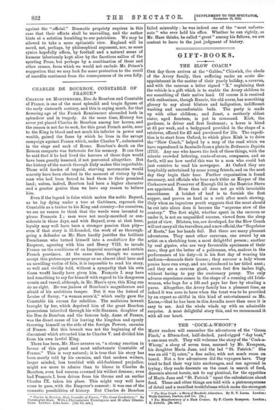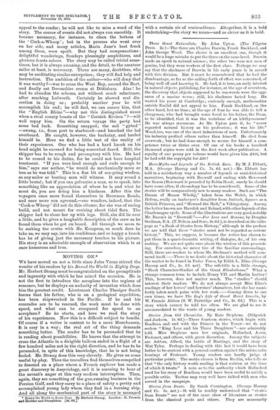THE COCK-A-WHOOP2 t Mawr readers will remember the adventures of
the Green Finch,' a fifteen-foot, half-decked, yard-rigged " day boat," a one-man craft. They will welcome the story of the Cock-a- Whoop,' a sloop of seven tons, manned by Mr. Kempson, his daughter Maria Jane, and the lad " St. Patrick." She was an old "2i rater," a fine sailer, with not mach room on board. Not a few adventures did the voyagers have. They tried to find their way into anchorages, and ran aground in trying ; they made descents on the coast in search of food, descents almost heroic, not to say piratical, for the appetites of Maria Jane and " St. Patrick " upset the calculations about food. These and other things are told with a picturesqueness of detail and a manifest truthfulness which make the strongest
• The Slow Coach: a Story of Roadside Adventure. By E. V. Lucas. London: Christopher Hare. With a Photogravure Frontispiece and 16 other Dlustra- t The Mieadvesteres of a Hack Cruiser. By F. Claude %alopecia. London t appeal to the reader; he will not like to miss a word of the story. The course of events did not always run smoothly. It became necessary, for instance, to clean the bottom of the Cock-a-Whoop ' ; but in the process she went over on her side, and many articles, Maria Jane's best frock among them, were spoilt. But they had compensations : delightful wanderings, Sundays pleasingly amphibious, and glorious feasts ashore. The story may be called trivial some- times, but it- is always amusing, and the detail, to the amateur sailor at least, is necessary. There are many, doubtless, who may be meditating similar enterprises ; they will find help and instruction. The ambition of the author—who will deny that it was worthy ?—was to cross the West Bay, ascend the Dart, and finally eat Devonshire cream at Dittisham. Alas ! be had to abandon the scheme, not without much reluctance, after reaching Lulworth. Certainly he showed real dis- cretion in doing so ; probably another year he will accomplish his end ; he will find, we can assure him, that the " English Rhine "—why not this distinguished name when a rival county boasts of the " Cornish Riviera " ?—will well repay him. On the return voyage the party had some bad luck. Something snapped; the sail " gybed" —swung, i.e., from port to starboard—and knocked the lad overboard. He caught, however, the backstay, and hauled himself in. Here we find a little test of the reality of their experiences. One who has had a hard knock on his head might be excused for being somewhat dazed. Still, the skipper has to be rough and peremptory with him. He had to be roused to his duties, for he could not have hospital treatment. "If you were loud enough and rude enough to him," says our author, " he would do mechanically more or less as he was told." This is a fine bit of sea-going wisdom, as any sailor or boating man will witness. It may sound a little brutal; but if you can galvanise a man, so to speak, into something like an appreciation of where he is and what be must do, you are doing him a kindness. After this the voyagers once more found themselves in Brownsea Roads, and once more ran aground,—one wonders, indeed, that the ' Cock-a-Whoop ' did not do this oftener, for she was of racing build, and not meant for cruising about tidal fiats. The skipper had to shore her up with legs. Still, she did lie over a little, and he gives a laughable description of the crew as he found them when he got on board. All through we seem to be making the cruise with Mr. Kempson, so much does he take us, we may say, into his confidence, and so happy a knack has he of giving just the necessary touches to his picture. His story is an admirable example of observation which is at once humorous and true.



































































 Previous page
Previous page